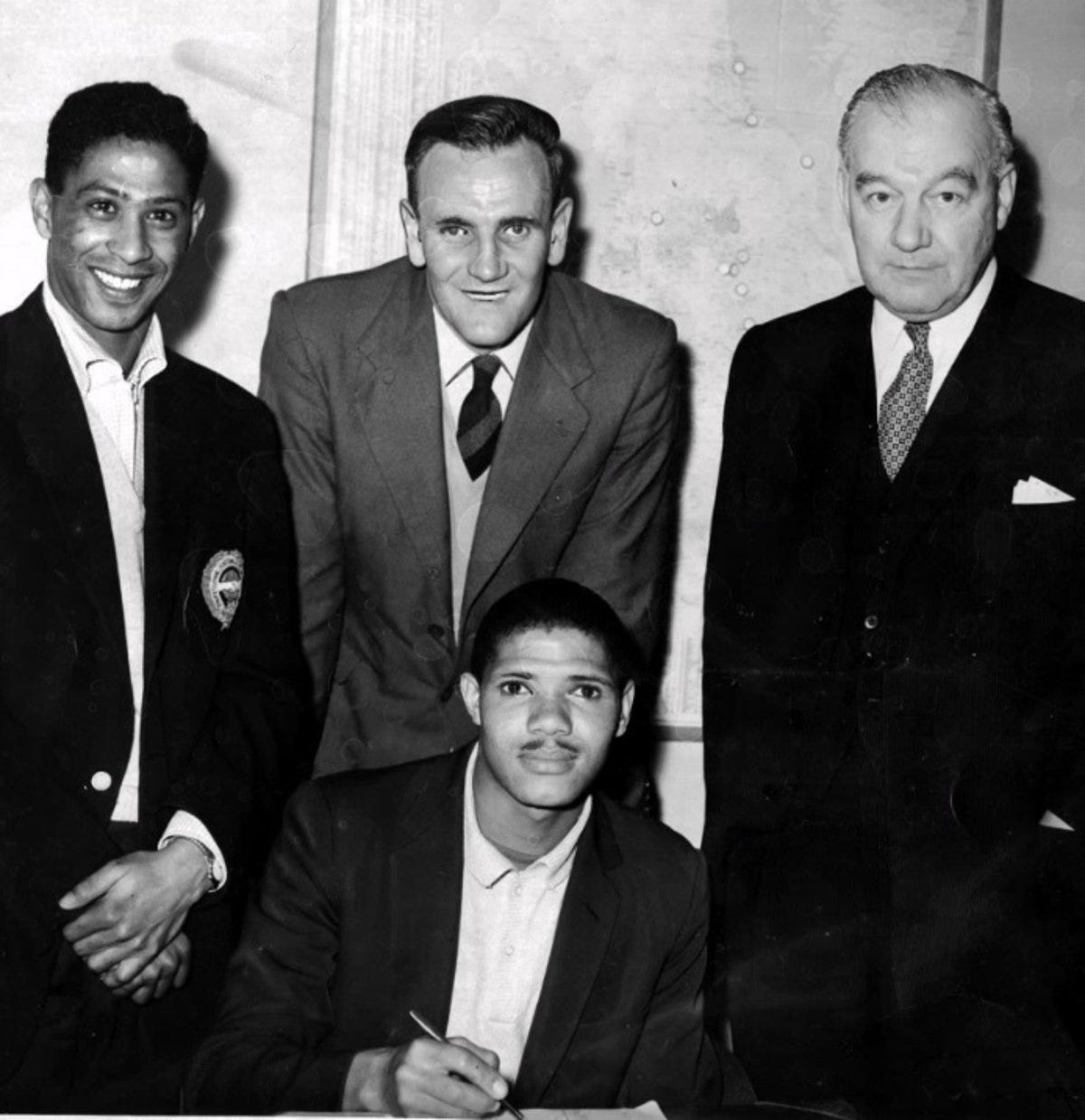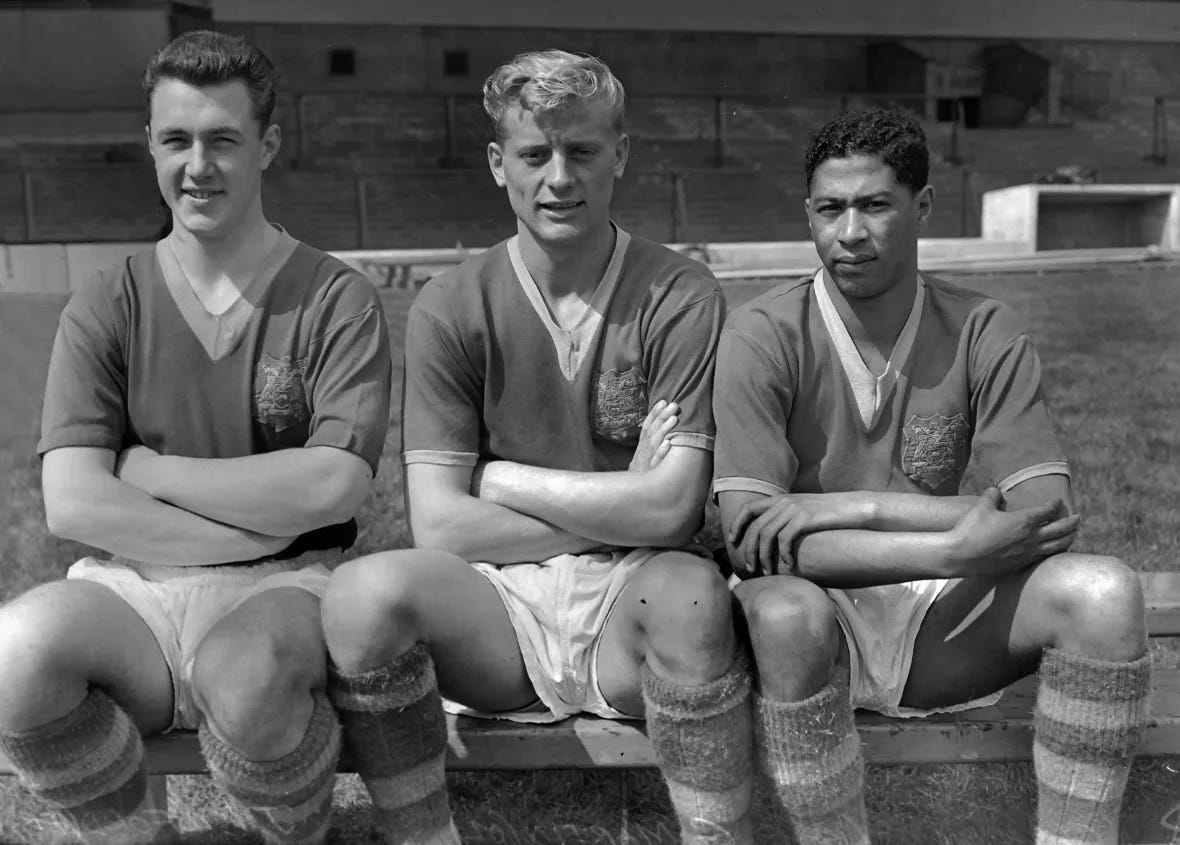The Opposite Flank
Gerry Francis, the first black South African to play in England’s top league in 1957, combined brilliant football skills with strong political convictions.
Since the early 20th century, English football welcomed and helped integrate white South Africans and Rhodesians into their teams, reflecting Britain’s deep political and cultural ties with its white settler colonies. For Black South Africans, however, the path to Europe’s top leagues was far more difficult and took time.
The first to break through was Steve Mokone, who joined Coventry City in the second division. Then, in 1957, Gerald (Gerry) Francis signed with Leeds United, becoming the first Black South African to play in the top league, the English First Division (now the Premier League). Francis was also the first Black player to represent Leeds.
In 1961, Leeds added another black South African, Albert Johanneson. As The Times of London noted later about the two South Africans in the same team together: “Leeds United FC did something believed to be unprecedented in professional British football and played two foreign-born Black players in the same team.”
While Francis’s time at Leeds was modest—52 appearances and nine goals over four years—Johanneson went on to play 172 games and score 48 goals. Johanneson also made history in 1965 as the first Black footballer to play in an FA Cup Final, when Leeds lost to Liverpool in extra time.
Still, Francis earned respect for his flair. “Albert Johanneson on the left wing would become better known,” The Times later wrote, “but many rated Gerry Francis, playing on the opposite flank, even more highly because of his dribbling skills and close control.”
It is worth noting that the late 1950s and early 1960s were a remarkable time for Black South African footballers in Europe. Alongside Francis, Johanneson, and Mokone—who was also on the books of Cardiff City, Barcelona, Marseille, and Torino—others like Darius Dhlomo (Heracles in the Netherlands) and David Julio (Sporting Lisbon) made their mark.
Francis played in Don Revie’s first match as Leeds manager in 1961, lining up with future legends Billy Bremner and Jack Charlton. Years later, Francis recalled Revie asking him about football in South Africa. He believed Revie’s eventual success at Leeds drew inspiration from Black South African playing styles: “In my opinion, [Leeds’ style of football] was more like a South African system… He wasn’t interested in the white teams because they just copied the English style.”

After leaving Leeds in 1961, Francis had a brief spell at York City before moving to semi-professional football with Tonbridge in Kent. Over three seasons, he played 174 games and scored 61 goals. He later emigrated to Canada, where he settled with his Trinidadian wife, Anna, and raised two daughters.
Francis passed away on May 10, 2025, at the age of 91.
Born in Johannesburg (he still had the accent right to the end) in 1933 and classified as “coloured” under apartheid (The Athletic identifies him as the “son of African and Asian parents”), Francis worked as a machinist in a shoe factory and played in segregated local leagues for coloureds and Africans or blacks (his clubs included George Goch and Blackpool). By his own admission, his older brother, Arvi, was a better footballer, but was waylaid by alcohol addiction. Francis watched as touring British teams played local white clubs and always knew black players were better. He claimed that Nelson Mandela often came to watch him play (coloured and African players played together on weekends, despite government segregation) and told him that Black players could outperform white players if given the chance. As a result, Francis saw his move to the UK as his historical duty.
An Indian friend (in later interviews, Francis apologized for forgetting the man’s name) wrote to Leeds FC requesting a trial for him and helped raise money for his ticket to the UK. Upon arriving in Leeds, Francis joined the reserve team, but after a successful trial was moved to the first team squad and signed a professional contract. (Not everyone was as lucky as Francis. In Peter Alegi’s 2004 book, “Laduma: Soccer Politics and Society in South Africa,” many footballers spoke of being robbed of their careers and opportunities by apartheid.)
Life in Britain brought new challenges for Francis. Though the country lacked the formal apartheid laws of South Africa, informal racism was widespread. Some cities maintained “color bars,” barring Black people from some pubs, clubs, and housing. Racial abuse from fans and opposing players was common, and Francis was frequently called a “wog,” a slur used against Black and South Asian people. “I was told there was no such thing [as racism] in England,” he later told reporters, “but I think there was a little apartheid there, too.” He believed racism within the Leeds coaching staff might have limited his opportunities on the pitch.
Yet not all experiences were negative. Francis also remembered moments of kindness and welcome. He roomed with Bremner, was included in team outings, and was stunned when white women asked him to dance in clubs—an unthinkable scenario back home.
In a 2012 interview with Backpass, a Tonbridge fan magazine, Francis recalled a moment of cultural shock soon after arriving in Yorkshire. While shopping, he saw a white woman scrubbing the floor—something he had only ever seen Black people do under apartheid. “My eyes nearly popped out of my head,” he said. When he told his landlady, she gently reminded him: “This is not South Africa. This is Yorkshire.”





Lovely piece of history Sean..
I hope you listened to the Zambia 2012 story on Jonathan Wilson’s podcast “it was what it was”… You’ll love that episode!